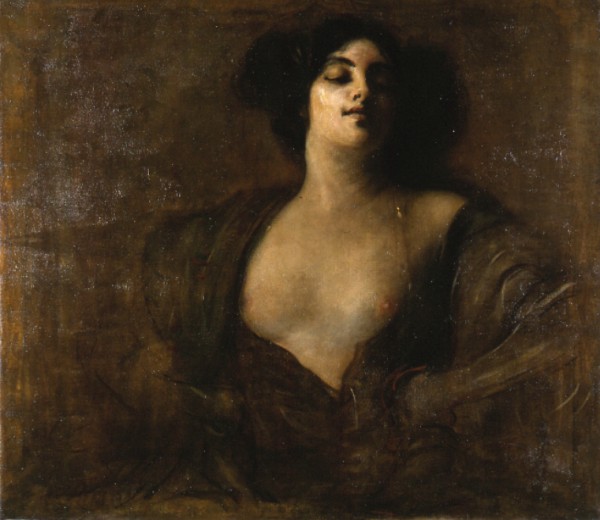A short musing about the contemporary ‘humanization’ of deities in esotericism
Admittedly, I only use ‘Hekate’ in the title as she seems particularly popular these days. So please go ahead and replace ‘Hekate’ with the name of your favorite god/goddess. Done? Well, if you can actually tell me your “favorite” (emphasis on favorite) god/goddess, you are part of my concern. Let me clarify: it is one thing to be a devotee of a particular deity and/or seriously work with one (or several) numinous entities (and this includes demons, angels and what have you, depending on your system) and be chosen by them as ‘servant’, vessel or even marriage partner (like with the shamanic spirit spouse or the Voudon mariaj lwa). It is a different thing to pick a ‘favorite’ just like one would choose a favorite ice cream flavor or a favorite famous person. Especially if one jumps around pantheons and changes deities like lovers – today it is Hekate and Odin tomorrow. The need to idolize certain people and admire traits in them seems to be almost a basic need of humanity and might have been transferred to the supernatural early on as well (or on the contrary stem from there); but in contemporary occulture it appears to even go beyond a fan admiring his/her ‘favorite’ and is turning into a ‘humanization’ of the numinous other. Almost like a ‘buddy culture’. If you ever heard someone talking of a god/goddess like they are their new best friends, you know what I mean. Just by leisurely researching personal accounts of working with specific entities on the internet this form of ‘humanization’ appears to me to be a more than marginal phenomenon in the esoteric and occult scene(s).
I intentionally use the term ‘humanization’ in order to differentiate it from the personification of deities (or other entities). I see the latter, i.e. personification, as a process of religious history in which divinized elements, natural powers, numinous experiences and so on become more and more endowed with human characteristics, e.g. traits of personality (compare polytheistic pantheons in particular) – but without losing their essential distance/difference to humanity. Even in cultures where there is a natural everyday close relation between the community and the spirits, gods etc. there is always still a clear line between humans and the numinous. But also in old myths and sagas of divine and human interaction, e.g. meeting a god in human form during ones travels, this distance remains, for example when the human realizes the true identity of his opposite only after the fact (not to forget that such tales are often a symbol for a certain experience, development etc. and not a literal interaction of a particular human being with that god/goddess). ‘Humanization’ as I observe it in today’s esoteric scene on the other hand seems to keep this difference on a first glance by frequently transforming the deities into even more potent beings than they had been before (e.g. giving a specific god from a particular culture a much wider domain of influence or new areas of power; sometimes turning them almost omnipotent as it is much easier this way to get all one’s needs satisfied). However, at the same time they diminish any distance/difference drastically by treating the deity similar to a friend and more often than not using it (unconsciously) as a kind of ‘reflector figure’1very loosely based on literary theorist Franz Stanzel’s terminus, i.e. reflecting the esotericist’s own perceptions, desires and associations. ‘Humanization’ at its peak becomes the (active) alteration of entities by random esotericists who downplay or outright deny all aspects of that entity that they do not like, traits that are no longer politically correct or do not match their morals etc. They also arbitrarily change and alter the way deities are worshipped, cutting away any aspect they find objectionable (e.g. animal sacrifice, blood offerings etc.). It seems that often only the ‘humanized’ shell of an original deity and its cultus remains while everything else is altered, added and subtracted to suit the current whims of the human devotee(s) – can this truly work? I doubt it…
In polytheistic cultures the worshiper devotes most of his/her time and means to the veneration of the deity most closest to his/her own circumstances and environment, e.g. social role, professional role, relations (remnants of which we find in the veneration of Saints in Catholicism) and/or the deity that chooses him/her. They often leave magical operations for a specific need to religious professionals (or receive instructions from them). Now in the esoteric and occult world of today many deem themselves the only religious (or magical) specialists they need (and while there is some grain of truth in that I am rather skeptical with this attitude overall but that is another topic). The individual’s ability for self-salvation and actualization of his/her divinity without dependence on a human intermediary lies at the very heart of many esoteric and occult movements after all. In connection with the extremely individual- and personality-/self-centered developments of the modern (Western) society it does not really come as a surprise when the gods are being turned into individual accessories as well. And yet it is a subject that I think we need to address and not only raise an eyebrow about now and then as it is a clear symptom of losing more and more any connection to the external numinous reality. As I tried to express already, it does appear that the deities chosen or rather created (either by modifications or outright) are quite often merely used as projection surfaces and reflector figures for individual wishes, perceived shortcomings or even traumata. It is no longer (or much less) the actually existent exterior circumstance that determines which god/goddess/power one turns to but an inner experience of deficiency, a desire to overcome individual flaws by relating to (incl. specifically invoking and/or ‘channeling’) a particular deity or ‘mixing and matching’ several. But the gods are still not your therapist!
A numinous entity might certainly be the source of particular insights and knowledge, mediated by dreams or divination methods for example, but that does not automatically turn them into our teacher, especially not if we have neither worked with this entity for a long time before nor seriously studied or worked within the culture or system it is rooted in. If you consider that many practitioners in the contemporary esoteric and occult scene reject a human teacher-student-relationship that goes beyond a sheer sharing of rational knowledge that they feel entitled to receive, it is particularly ironic when they easily base their ‘insights’, however, on ‘spirit teachers’ or deities. Instead of being potentially confronted by another human being that might call them on their shortcomings and demand from them to actively work on their development, they rather ‘submit’ to a deity of their own interpretation to “receive teachings and guidance” (quote from an Aphrodite-channeling practitioner) that surprisingly enough (sarcasm!) never really force them out of their comfort zones but either confirm their ideal or help them to temporarily aspire to a persona they would like to be.
To repeat, the ‘humanization’ of deities and its accompanying effects seem to me a very comprehensible development but one that is problematic – most obviously because of its almost covert psychologization of numinous powers and entities who thus become more and more mental, internalized and yes, imagined. While it might seem like reawakening or restrengthening the old gods by ‘bringing them to the scene’ (sometimes quite literally), I am concerned that it has much more the opposite effect. The only ‘god’ that remains in the end is the human self. In a previous post (Every man is an abyss) I already addressed the importance of contemplating our inner stability and motivation in pursuing occult work. Now I would like to add or repeat the importance of contemplating our motivation and reasoning in working with specific entities and how we perceive, treat and represent them. Some possible questions: Did they call us to work with them or have we chosen them out of a fancy or personal whim? Are they part of our current or lineage or the path we follow? Do we acknowledge all their characteristics even though we might not like some of them? Does our ritual work mirror their needs instead of ours? Are we willing and able to give the veneration, service and offerings they require? Does our work have a purpose beyond building self-esteem? Personally, I can only repeat that I think that we can best answer such questions honestly if we have a teacher, a mentor and a group of dedicated co-conspirators that help us to navigate around traps of psychologization and wishful thinking. If you are bent on the solitary path, however, I think the most essential advice is to always remember the numinous nature of the beings you work with and observe your own language, behavior and expectations. Do not mix and match or assimilate deities before you have not studied them seriously (or better yet, refrain from mixing and matching at all). I try to see personal characteristics of an entity as they have been transmitted in myth, ritual, by my hierophant or other religious specialists as pointers towards the experiences, aspects or traits this being embodies. I then try to consider how these are supportive in my overall cause and aim. Instead of ‘humanizing’ the numinous being and constructing it in accord with my needs, ethics or desires, I try to ‘see’ and connect to its essence, rather deconstructing the personification and uncovering its daemonic soul if you so will. If we are rooted within our Gnosis and follow our path, work our system, diligently and attentively, then there is no need to acquire spiritual ‘buddies’ as smokescreens of our own shortcomings and impotence.




1 thought on “My new friend Hekate”